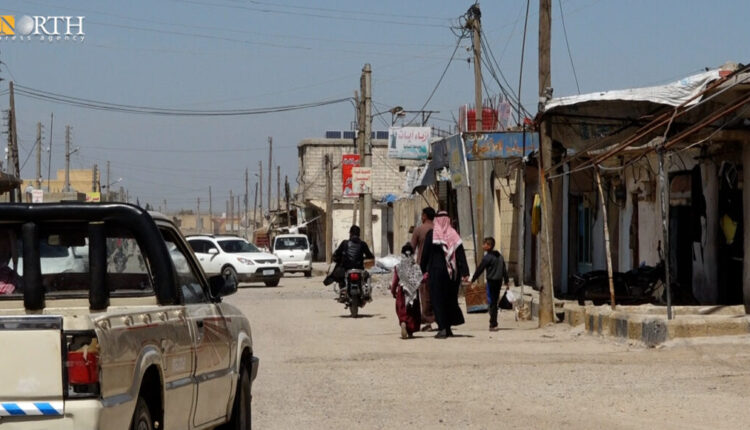Poor health services in Syria’s Raqqa worsens people’s situation
RAQQA, Syria (North Press) – Maryam fears one day waking up in the middle of the night to find her ill husband having a heart attack that might bring his life to an end due to the long distance it takes from her village to the nearest hospital.
Maryam Muhammad, 42, from the village of Hazima in the northern countryside of Raqqa, north Syria, is forced to take her husband to one of the hospitals in the city for treatment despite the long distance due to the lack of health services in the countryside.
The people in the countryside of Raqqa, particularly the northern countryside, suffer from deteriorating health services, a lack of medical centers in the villages, and an absence of treatment and medications, especially with the lack of medical NGOs supporting the health sector.
Muhammad said her husband suffers from heart disease. He previously had a stroke causing her to be constantly anxious about it happening again.
There is only one health center in her village that provides first aid in addition to some drugs for patients from nearby villages, despite the huge population density in that area.
Her husband’s critical medical condition and the lack of medicine in the Hazima medical center force her to buy expensive medication from pharmacies amid their deteriorating living conditions. The role of doctors is limited to prescribing drugs to a certain number of people.
The health sector in Raqqa suffer from several challenges as a result of the destruction of hospitals and medical centers and the reduced support by NGOs, which led to the declining numbers of workers such as doctors and nurses in medicals centers due to low wages.
Muhammad said that when drugs are available in the dispensary, it is only painkillers. She believes the support is concentrated in the city, whereas the villages are neglected.
She explains that the countryside needs medical centers to receive people throughout the day. She notes the deteriorating health services in the countryside as the people find great difficulty reaching the city due to the long distance.
Raqqa has been run by the Autonomous Administration of North and East Syria (AANES) since 2017 after the Syrian Democratic Forces (SDF) backed by the US-led Global Coalition liberated the city and its countryside from ISIS. The group had turned it to its alleged “caliphate”.
The AANES was first formed in 2014 in the Kurdish-majority regions of Afrin, Kobani and Jazira in northern Syria following the withdrawal of the government forces. Later, it was expanded to Manbij, Tabqa, Raqqa, Hasakah and Deir ez-Zor after the SDF defeated ISIS militarily there.
After the recent earthquake that hit Syria and Turkey, the support for some organizations that used to back rural health centers stopped, one of which was the center of the village of al-Abara in northern Raqqa.
The majority of people of al-Abara and neighboring villages, starting from the village of al-Kalta in the north reaching Shenina in the south, depend on this center along with Hazima and Khaniz centers.
Majed al-Hamoud, 64, from the village of al-Abara, is forced to buy his medicine from pharmacies now, after he received them for free from the dispensary in the village that was suspended two weeks ago.
He said, “The dispensary provided good services” and medical consultations despite the shortage of medicine. The man had a patient card allowing him to take the drugs he needed every month.
He added that closing the dispensary aggravated the suffering of many people amid the high prices of medicine and medical checkups in private clinics.
The people of Raqqa countryside complain about the high prices of checkups of doctors and the long waiting hours in hospitals and clinics as they leave in the early morning to come to the city.
Jassem al-Saeed, from the village of Abd Halo in northern Raqqa, has a different opinion on the matter. He said that closing the al-Abara health center did not make any difference to him.
According to al-Saeed, the center only offers “some types of painkillers.” Most of the times, the doctors refer the patient to private hospitals and clinics.
Al-Saeed has to visit the doctor every week because he has kidney stones. He does not have the financial ability to pay for the surgery to remove them. Both options wear him down.
“The health service in the countryside is terrible. We are poor people and do not have the money to pay the treatment’s expenses in private hospitals,” he said sorrowfully.

